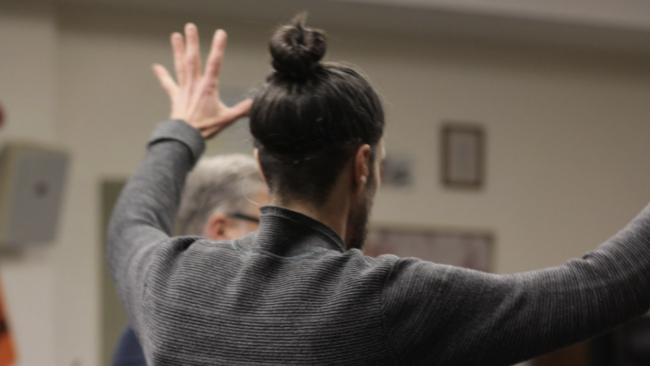What happens when a classical orchestra meets jazz musicians and two hours of improvisation? Keith Witty (‘95) has an answer.
On Thursday, February 27, three music classes — the Jazz Ensembles and the High School Orchestra — joined together to play a one-of-a-kind piece. The session, led by 1995 graduate and professional jazz bassist Keith Witty, challenged the notion that creating music is reserved for legendary composers like Mozart and Beethoven. Witty encouraged students to view music as fluid, accessible and open to experimentation.
Witty’s masterclass forced students to play their instruments unconventionally to create unique sounds and harmonies. The techniques practiced resembled those of social media ASMR artists; they clicked their nails on their instruments, mimicked the sound of air exiting a vent and hit their instruments to represent a collision. Witty then combined these skills with excerpts from pieces played by their classes. The result was a seven-movement musical composition filmed by Upper School Film Teacher Shaun Senivirante and a few of his students.
Witty’s primary goal was to help students see music as more than simply reading notes off a page. “Potentially the most rewarding part of this is that they get to see music from another angle because they’re used to it just being on the page and playing what’s there,” he explained. Traditional music education often centers around theory and structured practice, but Witty wanted students to experience the process of making music, not just learning it. “I wanted them to see an improvisational process because, in classical music or music that’s written, somebody had to make it up at some point. A lot of improvisers say that there’s no such thing as improvising, it’s really just composing on the spot.”
More than anything, Witty hoped to demystify the creative process, showing students that great music doesn’t have to be complex. “The complexity comes from bringing different ideas together, and a lot of the time, those ideas can be extremely simple,” he said, “Today was a collection of extremely simple ideas, and we put them together – we made something – because I want people to not feel like composing or creating things is hard.”
Fieldston’s Band Director Eric Gilley highlighted the value of incorporating experimental music in a traditionally classical setting. “In a full orchestra, we don’t get the opportunity to be part of experimental music often. But it’s accessible and something we can do easily. It was a fun and exciting opportunity for us to look at improvisation with Mr. Witty in an orchestral setting,” Gilley remarks.
Tom Christensen, the Music Department Chair, added, “Anytime you get a different teacher in here, you get a different perspective and a different way of looking at things, so I think it’s really important for the students who have me all the time to get multiple perspectives on how to improvise.” He mentioned how a recent trip to New Orleans and Witty’s class provided students with insights beyond what they typically encountered in his classroom. Christensen says, “My whole idea is to just get them out of their comfort zone and have a different perspective other than mine.”
Students expressed mixed opinions on the event. While some enjoyed getting to step outside their musical comfort zone, many were concerned about the loss of valuable time that could have been spent practicing for their upcoming concerts in April and May. Students were also not informed that they would be filmed before the session, so the presence of not one but five different cameras in the room was a surprise. Despite some concerns with the event’s organization, Witty was widely praised by students due to his fun and engaging teaching style.
Witty first discovered his passion for music at Fieldston. When he first arrived as a freshman, he played guitar, but after Christensen – then in his first year at the school – encouraged him to fill a gap in the jazz ensemble, he switched to bass. Over time, he became deeply immersed in both jazz and the bass, and spent most of his free periods practicing. “I caught the bug for needing music in my life here,” Witty reflects.
Now based in France, Witty has built a career as a performer, educator and producer. He primarily teaches bass students and tours Europe every few months with American artists. Since moving abroad over a year ago, Witty has yet to perform in the U.S. but plans to return soon for upcoming gigs. His schedule continues to fill with new projects, from producing music to continuing to perform extensively across Europe.
Witty leaves current students with a reminder of the extraordinary education and opportunities they have at Fieldston: “Fieldston kids should remember that they have a really special and unique opportunity. This is not the education that most kids in the world get. Use your time here to create, to explore and be yourself.”






